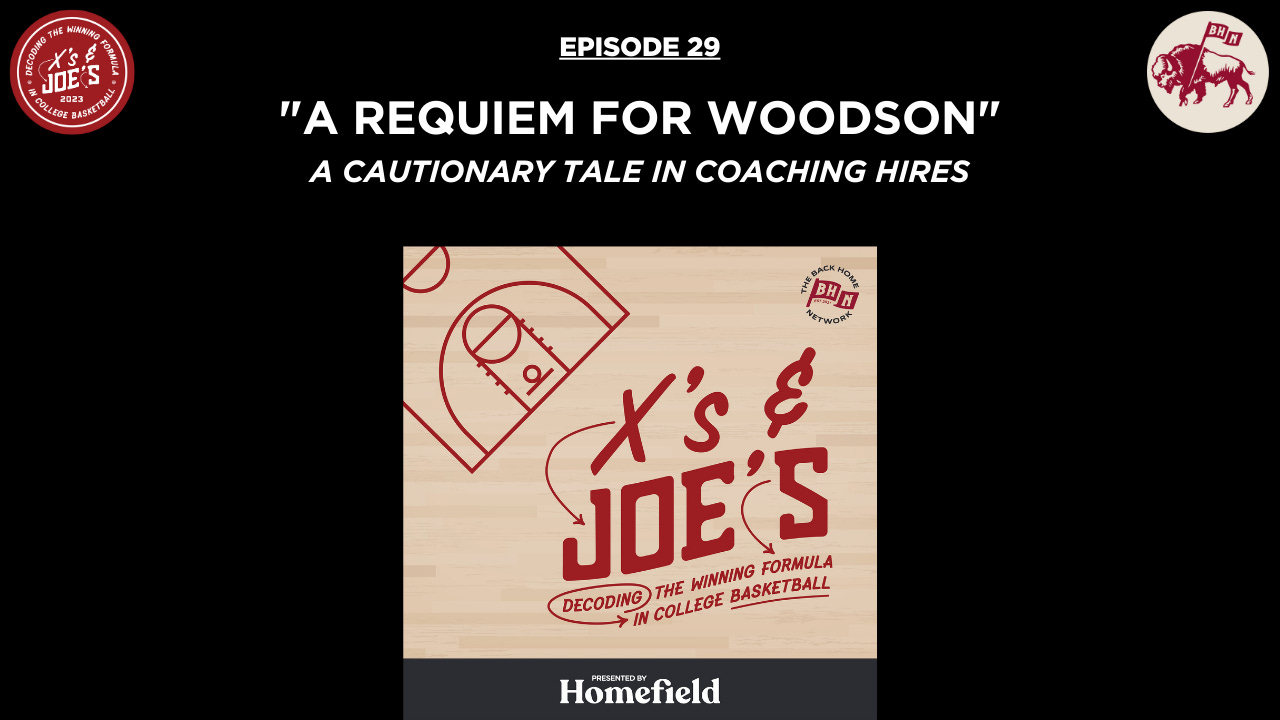[Xs & Joes #29] A Requiem for Woodson - A Cautionary Tale in Coaching Hires
Bob & Mike are joined by Josh Burton of Everything College Basketball to discuss how Mike Woodson's departure represents a cautionary tale about hiring NBA coaches without college coaching experience.
Episode 29 offers a comprehensive analysis of Mike Woodson's four-year tenure as Indiana University's basketball coach, examining the factors behind his hiring, the challenges he faced, and the broader implications for college basketball coaching searches at traditional powerhouse programs.
Hosts Bob Moats and Mike Wiemuth are joined by Josh Burton of Everything College Basketball to discuss how Woodson's departure represents a cautionary tale about bringing NBA coaches without college experience to the collegiate level, while also exploring how the transfer portal era is reshaping basketball programs at all levels.
Segment 1: The Challenge of NBA-to-College Coaching Transitions
NBA-to-college coaching transitions have a mixed track record (Penny Hardaway, Juwan Howard, Mike Woodson), with most struggling to adapt to the complexities of the college game
The college coaching environment requires significantly different skills than the NBA: recruiting, player development, NIL management, and relating to much younger athletes
College basketball demands systems that maximize less developed players, while NBA coaching often assumes elite talent that can create their own opportunities
Woodson faced a substantial age gap (often 40+ years) with his players, creating challenges in connecting with and developing young talent
The role of a college coach as GM, recruiter, and developer requires much more multifaceted skills than NBA coaching positions
Segment 2: The Woodson Era's Strategic Failures
Woodson's offensive system remained rooted in outdated basketball philosophy, featuring two traditional bigs clogging the paint rather than adapting to modern spacing concepts
Indiana consistently ranked among the nation's worst in three-point attempt rate (321st, 350th, 351st, and 321st in his four seasons)
Several talented guards (Tamar Bates, Kalib Banks, CJ Gunn) transferred away from Indiana and flourished elsewhere in systems that maximized their skills
Woodson's inability to adapt his system to modern basketball led to predictable offensive struggles against teams that employed drop coverage defense
Woodson's reliance on Trayce Jackson-Davis' individual brilliance masked tactical shortcomings early in his tenure
Segment 3: Recruiting Challenges and Program Direction
While Woodson improved Indiana's recruiting profile compared to the Archie Miller era, he struggled to land elite guards after early success with Jalen Hood-Schifino
Woodson went 0-for-31 on top-100 guard offers after Hood-Schifino committed
Notable recruiting misses including Braelon Mullens, Liam McNeely, and Boogie Fland severely limited Indiana's ceiling
The center-focused offensive style likely deterred elite guards from committing to Indiana
Woodson's alleged lack of effort in recruitment (reportedly going months without contacting five-star in-state recruit Braelon Mullens) reflected broader questions about his commitment to the modern demands of college coaching
Segment 4: Legacy and Lessons for Blue Blood Programs
Woodson's tenure represents a transitional period that did leave the program in somewhat better shape than he found it (went 2-2 against Purdue after Archie Miller went 0-7)
Never had a losing season, made two NCAA tournaments, and raised Indiana's recruiting profile
Traditional programs like Indiana must be willing to take bold coaching risks rather than "safe" options to return to elite status
The transfer portal era makes program rebuilding potentially faster but requires coaches who fully embrace modern basketball philosophy and recruiting
Indiana and other blue blood programs risk continued decline and fan apathy if they don't adapt to the changing landscape of college basketball
This episode provides a thoughtful examination of how the transition from NBA to college coaching often fails due to fundamental differences in the required skill sets and approaches. The discussion highlights how college basketball's evolution demands coaches who can adapt to modern offensive principles, navigate the transfer portal era effectively, and fully commit to the demanding schedule of recruiting.
The conversation serves as a valuable case study for athletic directors and programs considering similar hires, emphasizing the importance of selecting coaches with a deep understanding of the college game's unique dynamics rather than relying solely on professional pedigree or alumni connections.
The YouTube video is below, and you can listen to the audio wherever podcasts are available.
Use these links to subscribe to the podcast:
RSS Feed (to add it to a different podcast player)
Don’t see it somewhere you normally listen to podcasts? Let us know.
If you thoughts or comments about the episode, feel free to comment on YouTube video, comment below, or reach out to Mike (@M_Wiemuth_) and Bob (@BobMoats) on Twitter or in our BHN Discord.






Wow, this is really interesting!! I know we all lived it, but this summaries nicely the Woody Era. Thanks for walking us through this important exercise.